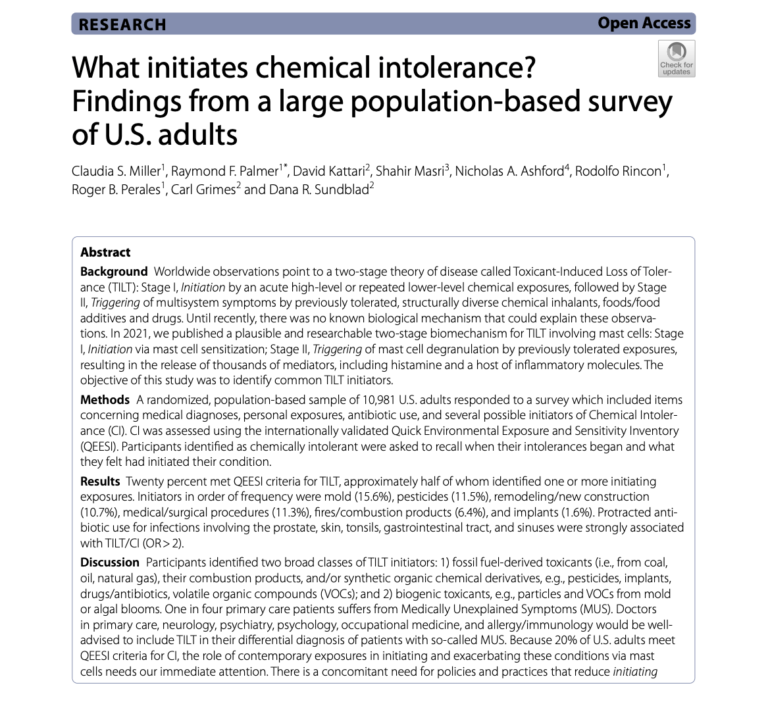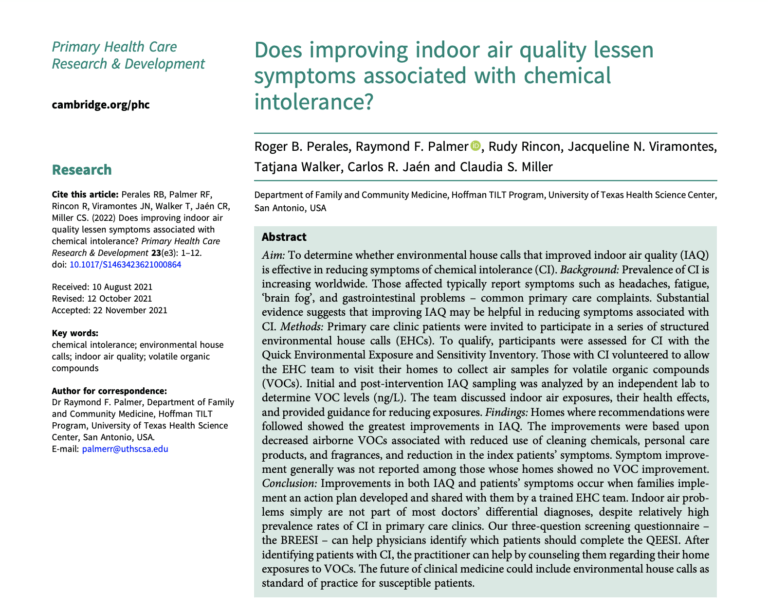BP Oil Spill Studies
Large Population-Based Study of U.S Adults Analyze What Initiates Chemical Intolerance
A large population-based study of U.S. adults finds chemical intolerance is initiated by fossil fuel-derived toxicants from oil and natural gas, synthetic organic chemical derivatives like pesticides, and biogenic toxicants from mold and algal blooms.
Read MoreStudy Shows Improved Indoor Air Quality Lessens Chemical Intolerance Symptoms
A 2022 study published by Cambridge University Press shows that improved indoor air quality can lessen the symptoms of Chemical Intolerance after exposure to chemical inhalants.
Read MoreALERT Report Provides Nexus to Implement EPA Dispersant Use Regulations
Dr. Riki Ott’s report, “An Opportunity to Make it Right,” explains how EPA’s new rules for dispersant use during oil spill response (driven in part by ALERT’s lawsuit) provide an opportunity to institutionalize proactive state and local involvement in Area Committees to decide what dispersants to use, if any, during oil spill response. Ott recommends ways to get started,…
Read MoreHealth outcomes among offspring of US Coast Guard responders to the Deepwater Horizon oil spill, 2010–2011
Health outcomes among offspring of US Coast Guard responders to the Deepwater Horizon oil spill, 2010–2011 (Hall et al.) February 3, 2023
Read MoreOil in the Sea IV: Inputs, Fates, and Effects. (National Academy of Sciences)
Oil in the Sea IV: Inputs, Fates, and Effects. (National Academy of Sciences) December 2022
Read MoreFine particulate matter and incident coronary heart disease events up to 10 years of follow-up among Deepwater Horizon oil spill workers
Link to Study Abstract Background: During the 2010 Deepwater Horizon (DWH) disaster, in-situ burning and flaring were conducted to remove oil from the water. Workers near combustion sites were potentially exposed to burning-related fine particulate matter (PM2.5). Exposure to PM2.5 has been linked to increased risk of coronary heart disease (CHD), but no study has examined…
Read MoreAssociations between airborne crude oil chemicals and symptom-based asthma
Link to Full Study Rationale: The 2010 Deepwater Horizon (DWH) oil spill response and cleanup (OSRC) workers were exposed to airborne total hydrocarbons (THC), benzene, toluene, ethylbenzene, o-, m-, and p-xylenes and n-hexane (BTEX-H) from crude oil and PM2.5 from burning/flaring oil and natural gas. Little is known about asthma risk among oil spill cleanup workers. Objectives: We…
Read MoreExposure patterns among Coast Guard responders to the Deepwater Horizon Oil Spill: A Latent Class Analysis
Exposure patterns among Coast Guard responders to the Deepwater Horizon Oil Spill: A Latent Class Analysis (Gribble et al.) May 20, 2022
Read MoreAssessing exposures from the Deepwater Horizon oil spill response and clean-up.
Assessing exposures from the Deepwater Horizon oil spill response and clean-up. (Stewart et al.)
Read MoreOccupational Asthma: The Knowledge Needs for a Better Management
Link to Study Abstract Occupational asthma (OA) is defined as asthma induced by sensitizer or irritant work exposures (Tarlo et al., 2008) and the costs related to OA patients are greater than those related to non-work-related asthma (WRA) (Lemière et al., 2013). The complete avoidance of exposure is the first measure to be taken, but sometimes may…
Read More


